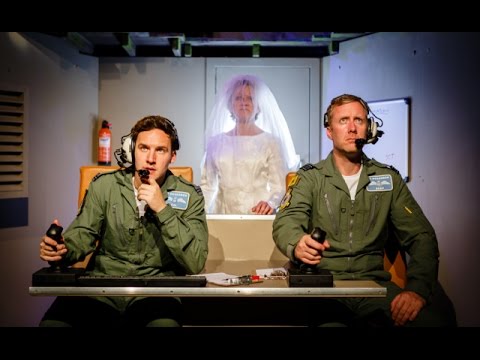A heavily symbolic exploration of the effects of drone warfare on those with their fingers on the trigger, Swivelhead aptly meshes the personal with the political, creating a tangible atmosphere of the ever-escalating pressure inherent in such a profession. Based on testimonies of serving drone pilots, the production utlilises a striking scenography underscored by sharp dialogue and a well-constructed soundscape to bring the narrative to life. John Welch’s direction includes the careful placement of multi-levelled areas on stage, which successfully turns every object in to a signifier; principally there to communicate the rising tension and illustrate the themes of flight and freedom. At ground level, split-staging introduces a central area as the claustrophobic ‘ops room’, workplace to Sergeant Paddy, the troubled protagonist. Downstage right we see the more homely sphere of his elder sister’s flat, a setting for frequent and intimate phone calls between the two, often on the subject of her forthcoming wedding. Looming above this is the more abstract space of the siblings’ childhood tree house, which we discover was a refuge from a troubled family dynamic, including a violent father. As the action intensifies, the spaces very effectively intertwine via abstract movement sequences that indicate Paddy’s unraveling mental health.
This sense of unease is also illustrated physically. As the drone team hone in on their target, Paddy experiences strange symptoms including skin itching, oddly curving nails and a sore neck, indicative of some abstract metamorphosis yet to be revealed. The ability to make decisions and comprehend the complex ethics of the role seem to become seriously impaired, becoming more marked until the crisis point; the eve of his sister’s wedding. it is here that the action reaches a rather sudden denouement; in a nightmarishly abstract sequence, Paddy finds himself atop the tree house. There he is at once berated by his colleague for his character flaws, whilst simultaneously practising a wedding speech that he doesn’t want to deliver, the wedding in his mind being a way of losing his too-close relationship with his sister for good.
Amidst this chaotic climax, Paddy’s physical incapacitation increases, his humanity relinquished until he actually becomes a bird himself. This device is quite an exciting one, allowing for exploration of a mind in decline, but its introduction perhaps felt a little abrupt and could have been further explored. I wondered if a vehicle for this could have been via the use of the puppetry, which was introduced in the fairly brief form of bird puppets at the start and at the resolution, but could have been extended. However, this is a production full of big ideas and interesting and imaginative concepts. On some levels it is rather confusing, but there is a sense of pleasure in how it revels in the abstract, whilst presenting an absorbing and complex main character who I wanted to know more about.

